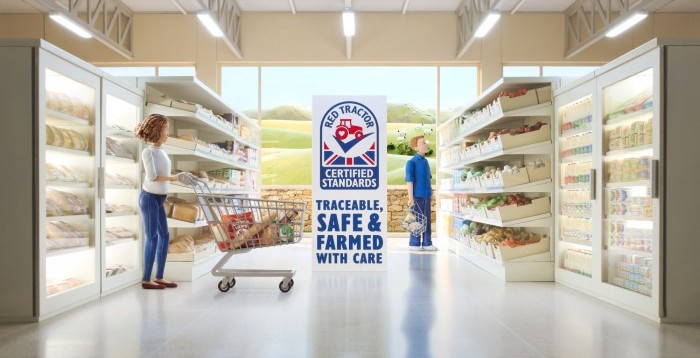New training requirements covering the handling of pigs and the use of veterinary medicines are among the headline changes to Red Tractor’s pig standards, announced today.
Version 5 of the farm standards covering all six Red Tractor categories will come into effect from November 1, with the complete standards for each sector being made available to members in August.
The changes have been developed over a 12-month period, with input from all key stakeholders– farming organisations, farmers, vets, processors and retailers – and a wider industry consultation that ran from January to March.
Over 3,000 pieces of feedback were fed into the various technical advisory committees and sectors boards for consensus, before being agreed by the main Red Tractor board.
Red Tractor said some new standards have been added because of legislation change or industry commitments to improving animal welfare, including the new Pig Welfare Code.
The headline changes to the pork standards include:
NEW
- All units must put measures in place to minimise the risk of tail biting and avoid the need for tail docking. This includes an annual risk assessment on all units and an action plan on farms rearing docked pigs. Anyone carrying out docking needs to have evidence to support the continued need, including a detailed quarterly veterinary review. Monitoring health and performance is key to ensuring oversight of pig health and welfare.
- Anyone involved with the care of pigs must now complete online pig welfare training in key areas including best practice around moving and handling pigs to ensure consistent training so that all pigs are always treated compassionately.
- At least one person on every farm must undertake training in the responsible use of medicines. Where a farm is identified as persistently using high amounts of antibiotics, they must now develop and implement an action plan with their vet to reduce antibiotic use.
- When there is an outbreak of disease, it can be useful if nearby farms are made aware so they can tighten their biosecurity. To facilitate this, members must sign up to the Significant Diseases Charter and report disease outbreaks.
- All farms with workers must have a written Health and Safety policy – this is a slight advance on the legal baseline which only applies to businesses with more than five employees. Given high fatality figures in the industry Red Tractor believes it is essential to check policies are in place and communicated to workers.
UPGRADED
- The enrichment standard, in line with Defra’s Code of Practice, to require specific combinations of enrichment materials and objects, to ensure this important behavioural need of pigs is met.
REVISED
- Stock people need to be robustly trained on pig euthanasiato ensure best practice is maintained. Initial euthanasia training must now be carried out by a vet or via a Humane Slaughter Association course. Where a mechanical device is used for piglet euthanasia, we have aligned our requirements with the Humane Slaughter Association’s guidance to ensure effectiveness.
NOT ADOPTED
Some of the proposals consulted on have not been adopted into v5 of the standards. These include:
- Recommendation for increased space allowances for growing pigs
- Recommendation for increased trough space for restrict-fed pigs
- Requirement that sows must enter farrowing crates at least 3 days before farrowing
- Requirement that access to pigs by cats is prevented
- Requirement for breeding units to have evidence from finishing units of tail bite issues
- Requirement that pigs are not transported on the same vehicle as other species
- Maximum journey time of 18 hours.
Two objectives

Red Tractor’s CEO Jim Moseley said: “We set out to hear from all stakeholders and to engage as much of the farming community as possible, and I’m delighted by the amount of feedback that was generated by the review. This has been enormously helpful for informing the work to finalise the new version of the standards.
“Our standards need to achieve two key objectives – first to meet the needs of consumers who expect high standards but shop keenly on price, and second to provide farmers and the supply chain with manageable standards. Getting that balance right then also satisfies the needs of food businesses and government.
“With its structures of sector boards and technical committees, and through the comprehensive feedback of the consultation, Red Tractor is in a fortunate position to achieve that crucial balance that benefits the UK food supply chain.”
NPA chief executive Zoe Davies, said: “This is a great opportunity for UK pig farmers to demonstrate how committed they are to continually improving standards on farm, not only building on our high welfare standards but increasing confidence in our supply chain and retaining customer support for UK pork”.
Stuart Roberts, NFU deputy president, said: “It has never been more important for British agriculture to be in tune with the public. Following feedback from the NFU and farmer and grower licensees, Red Tractor has developed the right standards to progress our industry, while balancing the needs of farmers with the evolving demands of shoppers and the supply chain.”
Andrew Opie, British Retail Consortium chief executive, said: “Customers trust us to make sure the food that gets to their plate has been produced to the high standards they expect. This fifth standards review has given us another opportunity to listen widely to everyone’s viewpoint. It is important the standards don’t stand still, and we look forward to more progress on climate change and ethical labour over the next few years.”
Bolt-on modules
Red Tractor also announced, in response to feedback during the consultation, it will develop optional modules in some areas, which will ‘bolt on to the core standards’.
These are intended to reflect the fact that, while changes to Red Tractor’s core standards mean members keep pace with mainstream market demands, some end-users will require farmers and growers to demonstrate their business credentials on the important issues of worker welfare and sustainability.
Further information on how the modules will be developed and when they will be launched, will be available next year.
Mr Moseley added: “One of the key themes from the review was the appeal for Red Tractor to provide some flexibility within the schemes.
“This proposed approach will deliver the right standards across the supply chain which could deliver even greater market access for our farmer members with minimal impact on the audit burden. We will continue to work with our supply chain customers to explore how this could be delivered effectively.”





